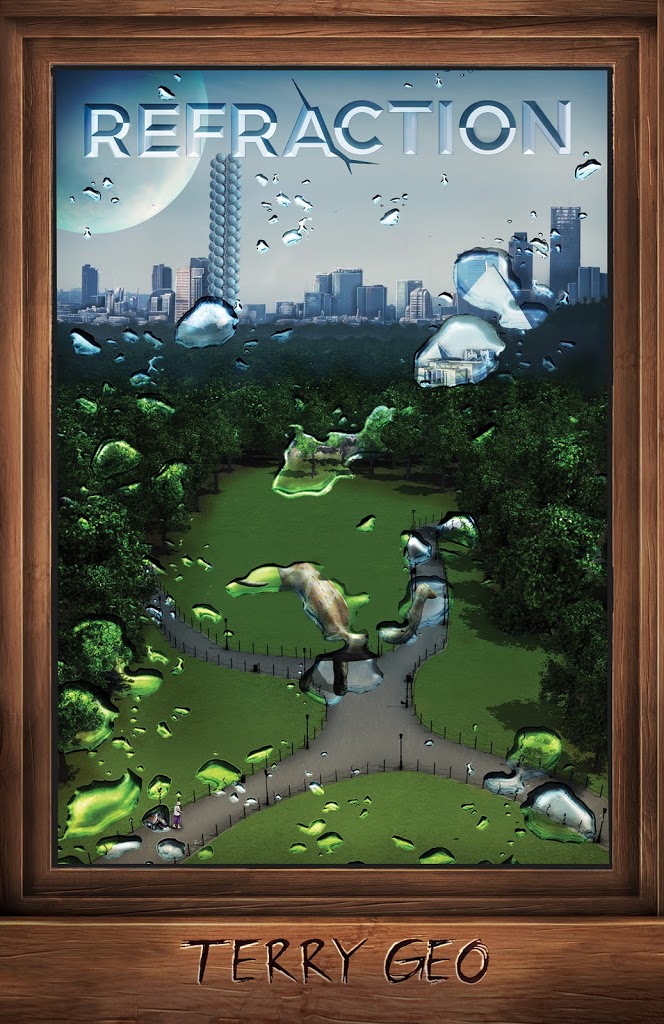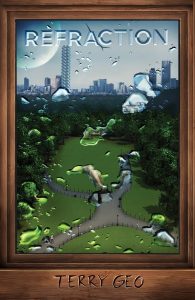I love writing. It’s what I do to relax, when I need to create, when my brain has so many ideas churning around that I have to jot something down. I enjoy creating characters, storylines and unexpected surprises, so the whole writing process is fun. Editing was time-consuming and frustrating, but I was still inside the world I created, so it never felt like a chore. The hardest part has been and still is, marketing. I have worked in television, journalism and theatre, I’ve been in pressure-cooker environments and demanding roles before, but nothing prepared me for the difficulties of self-publishing. I saw success stories like Wool and The Martian and believed Refraction would be instantly up there with them. The problem: I’m an unknown author, self-publishing my debut novel and no one knows who I am.
The current drawback with self-publishing, is that there’s no quality control. I edited the book, going through it line-by-line for three months, I paid for a copy editor to do the same, an artist for the cover, a graphic designer for the title, a PR company for the marketing, I bought a domain name and learned how to build a website, I edited a trailer together and I had a book I was sure everyone would enjoy reading. I did everything I could think of and spent every penny I had on producing the best novel I possibly could – but not everyone does that. Anyone in the world can write anything they want, assign a price to it and self-publish, regardless of the quality – and the public knows this. Are you going to risk 5.99 on something that could be illegible or have a story that goes nowhere? Do you really want it invest your time in something that could turn out to be unfinished or lazily written or have hundreds of spelling and grammatical mistakes? I know I don’t. That’s why reviews are vitally important, because if ten people like it, there’s a chance you will too. Unfortunately, reviews are more difficult to obtain than you’d think. Not only do you have to get those first few people to read your book, you then have to wait for them to finish it and hope they leave a review. Not many people do, and even when they want to, Amazon might not even let them. I know at least four people who can’t leave a review and two of them are my Mum and brother. Amazon won’t talk to me about this issue for data protection reasons, but it seems you now have to spend at least £50 a year with the company to leave a review, even if you’ve bought the book. I have collated them all and added them to a page on my website, but because no one knows who I am, no one is visiting that page. It’s a vicious cycle.
Thankfully, I found the writing community. Until this year, Twitter was a platform I actively avoided. As I writer, I need the ability to get out what I want to say without limitation, so I kept to Facebook. It was only when my PR company explained the benefits of Twitter, that I gave in and thankfully, it’s been a really positive experience. The people I’ve met and communicate with on a daily basis are like a family. We all support each other, offer advice and promote each other’s work. There are so many writers, like me, who self-publish and then find themselves lost in a confusing abyss, screaming, yet never heard. The writing community gives that voice a platform and somewhere to showcase who you are and what you do. Without them, I’d still be on Facebook, endlessly promoting my book to family and friends, who’ve already bought it.
Two months on and I have a lot more media interest and sales have started to pick up. Every review that has come in has been 4 or 5 stars and I’ve been praised for the story, the pacing, the editing and the cover, all things I really worried about before publishing. This isn’t your traditional science fiction novel and I didn’t know what the reaction would be. Thankfully, all positive so far.
As we near the end of the year, I’m more hopeful for the future. I’ve stopped constantly worrying about the quality and content of the book and am more focused on getting those elusive reviews. It doesn’t matter how much I praise the book, as the author, what else would I do? What really matters are the views of the readers. In January, I’ll start writing book 2 and I hope to have it finished in time for next Christmas, by which time, people will hopefully know me and Refraction better.
First featured on https://kate-hill.com/blog/?p=8185
Most stories start at the beginning; this one begins at the end. At least for Maria. Her sudden death sends shockwaves through her family and pushes her grieving mother to the very brink of insanity. After exhausting every avenue conventional medicine has to offer, Maria’s father, Henry, brings together the world’s greatest minds in the hope of carving out a new path. Months pass, and as Henry watches his beloved Elena slowly drift away, he begins to lose faith. It is only then that a solution presents itself. A discovery so momentous, it saves Elena and reveals the most important scientific and technological breakthrough in modern history.
Silicate is founded; a privately funded facility which delves deeper into the human mind, able to discover answers to questions we are yet to ask. Securing Silicate’s secrets becomes of utmost importance; even after treating hundreds of patients, the public are still unaware of the wonders and terrifying reality Silicate has unearthed . . .
The world you know is only half the story.
Refraction
Author: Terry Geo
Genre: Science-Fiction / Fantasy
Most stories start at the beginning; this one begins at the end. At least for Maria. Her sudden death sends shockwaves through her family and pushes her grieving mother to the very brink of insanity. After exhausting every avenue conventional medicine has to offer, Maria’s father, Henry, brings together the world’s greatest minds in the hope of carving out a new path. Months pass, and as Henry watches his beloved Elena slowly drift away, he begins to lose faith. It is only then that a solution presents itself. A discovery so momentous, it saves Elena and reveals the most important scientific and technological breakthrough in modern history.
Silicate is founded; a privately funded facility which delves deeper into the human mind, able to discover answers to questions we are yet to ask. Securing Silicate’s secrets becomes of utmost importance; even after treating hundreds of patients, the public are still unaware of the wonders and terrifying reality Silicate has unearthed . . .
The world you know is only half the story.
 Author Bio
Author BioBorn in Derbyshire, raised in Yorkshire, resides in London, Terry learned from a young age that he was different from his peers. He preferred the company of girls over boys, didn’t like sports and would write at every opportunity. He was bullied throughout his school life both physically and verbally and had to deal with the cruelty of others from an early age.
Terry Geo wrote and directed his first play at age eleven. At sixteen, he started work in television, writing scripts and becoming the youngest director in the country. Terry applied for a job while taking his final exams and started work in television the week after he finished school. For the first time in his life, he found a world where he could shine and be accepted for who he was. He came out as gay to his parents the following week and never again hid his sexuality from anyone. At seventeen he became the youngest director in the country, producing a light entertainment show for Yorkshire Television. After a short stint in a boyband, Terry went back to writing, editing two national publications. He toured the world as an actor, moved to London and in 2017, wrote and directed a musical for the London stage. A year later, Terry married Ken, the love of his life, in London. After their honeymoon in Thailand, he returned to a book he had started some years before. In January 2019, his cat Megara sadly passed away. This hit Terry hard and in memorial to her, he wrote her into the book he was writing. She is now a part of Terry’s debut published novel, Refraction.

